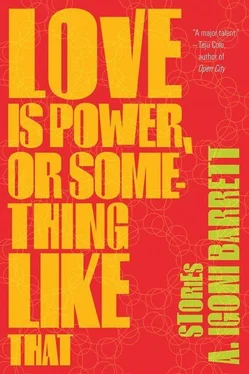
Godspeed Anabraba, in the ignorance of childhood, made a pledge to himself never to fail at anything. His father, a tall, handsome man who was renowned as a singer and dancer, was a fisherman whose offspring were strewn across the ports of the Niger Delta, so Godspeed had to fend for himself from a young age. His mother — who remained unmarried after the mishap of unexpected pregnancy — did her best to ensure he attended primary school, but he had to put himself through secondary school by the work of his hands. Godspeed was a bright, dedicated student, and by the end of his secondary education he had secured a scholarship from the British colonial government to attend university in the mother country.
On his return eleven years later to become a central member of his young country’s ruling bureaucracy, Godspeed, after erecting a mansion in his late mother’s village, decided to take a wife. He set about this task in a detached, punctilious manner: he considered only the prettiest and most accomplished maidens from the best families. As expected of a man who viewed failure as a sign of bad character, he succeeded in his search. There was no exaggeration when the bulletin board of the oldest church in the village carried the notice:
We publish the banns of marriage between Godspeed Anabraba (senior civil servant and pride of our community) and Perpetua Young-Harry (graduate of the Maryland School of Catering and second daughter of Chief S. K. Young-Harry), both of this Parish. If any of you know cause or just impediment why these persons should not be joined together, ye are to declare it. .
Even defeated suitors of the bride-to-be, astonished by this announcement, agreed it was a match that for convenience couldn’t be faulted.
But the union had more faults than the tectonic plates of Nippon. For one, Godspeed did not love Perpetua, and this lack of feeling was reciprocated. He was the oppressor who appeared from nowhere, the stranger with whom she had exchanged not one word before he won her father’s consent. At eighteen she was hungry for games of love, while he, thirty-four and employed in a stodgy profession, was an old man already. As the day of the wedding approached, Perpetua contemplated running away, embarking on hunger strike, or giving her virginity to Furo Fiberesima, her high school classmate and the youngest of her wooers, the man she would have married if she had a choice. But she pushed off a decision until the big day arrived, then walked up the aisle on the arm of a proud father. (As they approached the altar she thought she felt her courage hardening, but her father, unknowing, whispered to her with a glaze in his eyes that in her gown she looked exactly like her mother, who surely was smiling down from heaven on this happy day. Under her veil Perpetua’s face settled into a mask as stiff as a corpse.) In minutes it was done, they were declared man and wife, and she held up her face for the lifting of the veil, squeezed her eyes shut for their first kiss.
The couple set off on their honeymoon straight from the venue of the wedding reception. The trip to the international airport in Lagos, and the long flight to London, was borne in silence. The fact of her new position was brought home to the bride by the surrealness of having her passport handed back to her with a “Welcome and have a nice stay, Mrs. Anabraba, ” and this was followed by the whirl of emotions — relief, anxiety, puzzlement — as she noticed that their luggage was carried into separate hotel rooms. That night, for their first date, her husband took her to the restaurant of their hotel. Dinner was accompanied by candles and soft music, but also by the chatter of the other diners, whose frank stares at the black pair so discomfited the bride that as she bent to eat her soup a teardrop fell into it, rippling the surface.
“Don’t reward these racist pigs with your tears,” her husband said. His voice was calm, and his gaze, when she raised her eyes, was steady. He dabbed his lips with the edge of his napkin, took a sip of wine. “When I remember some of the things I endured when I was in university here, like the time. .”
The drone of his conversation made her feel like a married woman. She straightened her shoulders, removed her elbows from the table, and ignoring everybody except the man who sat before her, dining like a presiding king, she enjoyed her meal.
After dinner, they retired. Her husband walked her to her room, took the key from her to unlock the door, and handed it back. With a kiss on the cheek, he bid her good night.
She was unhooking her dinner gown when she noticed the tightness in her chest, the frantic pace of her heart. “Traitor,” she murmured, tracing the curve of her left breast with a forefinger. As the gown slipped from her shoulders she executed a pirouette and skipped about the room, flinging off her undergarments as she clambered over the chairs, the bed, her scattered luggage. With blood pounding in her ears, she halted before the dressing-table mirror and stared at her nude body, then raised her hands and caressed her face, her arms, her soft belly, imagining his eyes, his fingertips, his lips, her pores blooming with sensation. The strength of this feeling stirred the ashes of another, and she tried to remember what was tugging at her happiness like tissue paper dangling from a shoe heel. She remembered the anxious smile on Furo Fiberesima’s face when he confessed his love on the night of the graduation dance.
“Traitor! Traitor! Traitor!” she hissed at her reflection, and clapping both hands to her mouth, she spun away from the mirror.
A hot shower restored her good sense. As part of preparations for bed, she dabbed perfume behind her ears, on her neck, between her breasts. She slipped on a gauzy pink nightgown that before this night she would not have had the courage to be seen admiring in a shop window. Then she jumped into bed, pulled the covers to her chin, and waited for the knock on the door. She waited for so long that her terror that it would come changed to a foreboding that it wouldn’t, and when it didn’t, she cried herself to sleep.
She woke up alone in bed the next morning, still the same person, joined in marriage and yet not, not yet, her whole life ahead of her, a white heatless sun shining on her face. She sang in the shower, she hummed as she pomaded and powdered and primped, and when he knocked, she danced to the door and threw it open. Her husband reacted to her gaiety with a wide smile, and offering her his arm, he led her downstairs to breakfast.
A week later the honeymoon was over, the newlyweds returned to Nigeria, but Godspeed still did not exert his conjugal rights. By this time Perpetua’s gratefulness had given way to suspicion, which grew fatter every day on a terror she nursed, that instead of the Bluebeard she feared she had married, she’d fallen into the clutches of something less than a man.
In other details, Mrs. Anabraba’s life was perfect. She was mistress of a five-bedroom house in one of the choicest locales of Poteko — a district formerly known as Royal Palm Hills but renamed after independence Ogbunabali Flats, where the colonial bureaucrats had clustered their mansions and recreation clubs connected by a crisscross of palm-lined boulevards. As a child of the village, a nursling of open spaces, Perpetua adored her front garden with its coffee rose and potted poinsettia and stone-lined fishpond, its allamanda hedges and bamboo garden chairs. At the back of the house more plants, a shaded grove of fruit trees; and a kitchen garden in the corner, planted and tended by her. She had a cook, a housemaid, a servants’ bell in every room. Her request to redecorate the house, which was furnished in the taste of a gentleman’s club, was denied, but she was granted permission to shop for as much furniture as needed to remodel her bedroom. There was no end of grumbling from the cook — a Fante man named Yaw Kakari who had worked for the Scottish bachelor who was the previous occupier of the estate — as she set about stamping her authority on the kitchen, the only part of the house where she felt she could disobey her husband’s order. She took an inventory of all the tableware, kitchen utensils, and food provisions. She had the kitchen walls — which were painted colonial white, like the rest of the house — redone in pastel green. She replaced the old gas cooker with one that had an electric hot plate and inbuilt oven. To register his displeasure at the overthrow of the old order, Yaw Kakari burnt the first pot of roast pork he prepared in the new oven.
Читать дальше


![Сьюзан Кейн - Quiet [The Power of Introverts in a World That Can't Stop Talking]](/books/33084/syuzan-kejn-quiet-the-power-of-introverts-in-a-wo-thumb.webp)










